Punktendo: The 8-bit punk games you didn’t play
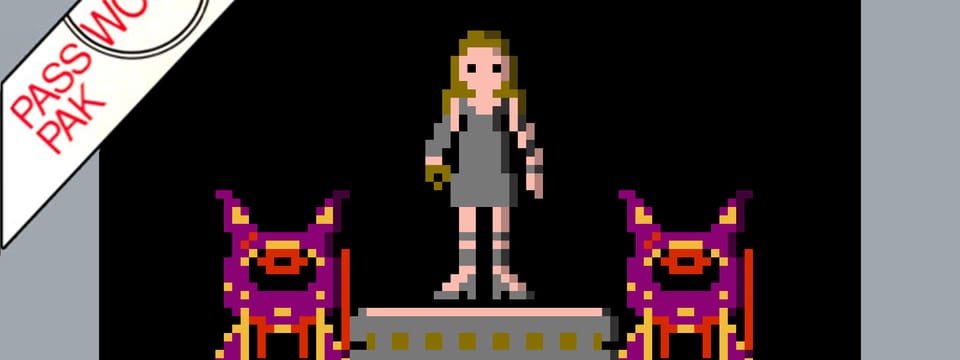
The original Nintendo Entertainment System arrived on US shores during a divided era in American politics. The Iran hostage crisis concluded with eight American casualties in April 1980, marring the end of President Carter’s first term and contributing to a landslide victory for Ronald Reagan. The discovery of AIDS in 1981 preceded an epidemic that was especially devastating within the gay community throughout the decade. When the console launched in North America in 1985, Reaganomics were in full swing, and disaffected youth responded with the rise of hip hop and punk rock. However, early NES titles were yet too primitive in scope to tackle political themes. Games were childish diversions rather than interactive art.
Brooklyn-based animation storyboard artist Jeff Hong is on an 8-bit mission to challenge this status quo. As the creative mind behind Punktendo, a web-based project featuring playable punk parodies of classic NES titles, Hong grew up playing Nintendo games and listening to punk music. The latter shaped his progressive political values, citing activist artists like Propagandhi as an influence. A desire to bring these passions together led to learning how to edit NES games using a process called “ROM hacking,” placing punk personalities and social issues into pixel-perfect recreations of the original games. It’s a passion project fully in line with the DIY (“do it yourself”) ethos, bringing punk, play, and politics together.
placing punk personalities and social issues into pixel-perfect recreations
Punk isn’t always serious despite its inclinations to take itself seriously; a duality making it ripe for light-hearted observation, and an effective medium for delivering a powerful social message. Just as not all punk music is overtly political, nor are all Punktendo games. The process for aligning specific bands, titles, and issues differs based on what makes sense for each game. For example, Hong selected fellow Brooklynites Chumped for Super Chumped Bros. 2 by virtue of having three men and one woman in the band (one member to stand in for each of Super Mario Bros. 2’s original protagonists). PUP Tour features Toronto noisemakers PUP traveling across North America, re-envisioning Rad Racer as a touring band simulator. Other titles simply poke fun at popular punk personalities, such as Fat Mike’s Golf (tying the 49-year-old NOFX frontman to a sport stereotypically associated with retirees), and Ben Weasel’s Punchout! (mocking the outspoken and short-tempered pop-punk frontman’s penchant for punching fans).
On a surface level, it’s easy to consider Hong’s work to be a novel distraction. To some critics, remade Nintendo classics infused with youth culture references may not pass as high art. Nostalgia and novelty value do play a significant part in their appeal, and it’s certainly possible to mindlessly pass an afternoon playing through each title—they are functionally the same as their original NES counterparts after all. However, beneath the pixelated retro veneer of Hong’s games lies a sincere desire to create thought-provoking art, and Hong’s work is arguably most compelling when it taps into punk’s rebellious political spirit. While many of the Punktendo games require some degree of familiarity with the punk personalities parodied to fully appreciate, the more topical titles require only a modest touch on the pulse of public life in modern America to understand.
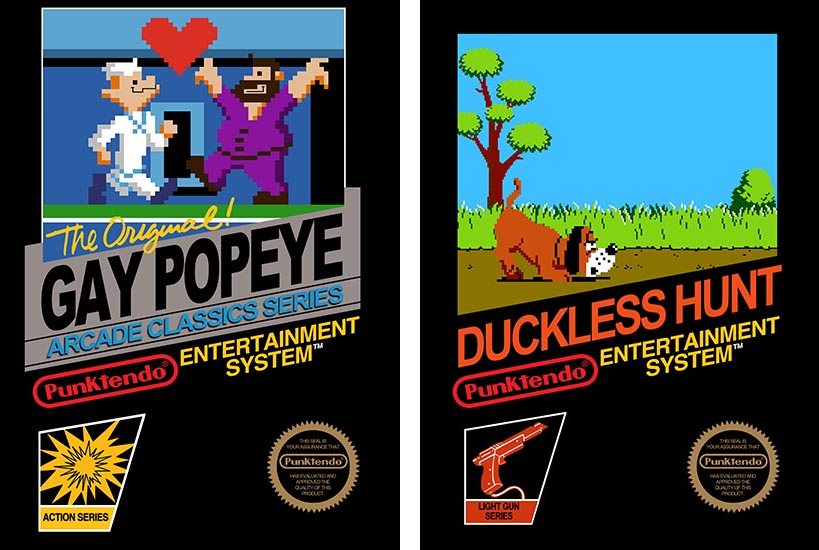
Similar to Hong’s Disney Unhappily Ever After project—an image series depicting Disney characters in brutally realistic scenarios—connecting childhood nostalgia with real-world problems is where his work is perhaps most impactful. These titles are not mere Daily Show-esque pressure valves for frustrated liberals to laugh at while letting off steam (though a few rounds of Donald Trump’s Punch Out! may very well prove therapeutic). Rather, in Hong’s view, they are intended to further serious discussion about important issues in addition to creating enjoyable diversions.
“At some point, I hit on the idea of making these games more punk-focused, but also at the same time, I was trying to make them socially conscious games as well,” said Hong. “It sort of fit into the ideals of punk, so that’s why I added it into Punktendo. They weren’t supposed to be taken as jokes. These were definitely more serious topics, and I was hoping people would see them as that.”
The element of interactivity introduced by games also forces players to actively confront issues rather than passively read or watch news stories about them. Racist Alley, for instance, puts players in the uncomfortable position of deciding when to pull the trigger on violent criminals while avoiding killing police officers and innocent bystanders. Selecting between three different environments—Ferguson, Missouri, Trayvon Martin’s home town of Sanford, Florida, or a trick shot mode—adds a grim layer of emotional weight to making the wrong decision. It’s similar to simulations used in research studies that have corroborated evidence showing a majority of individuals are more likely to instinctively shoot black people at a higher rate than individuals of other ethnicities.
connecting childhood nostalgia with real-world problems
The Original Gay Popeye takes a less violent but no less thought-provoking approach in challenging heteronormative stereotypes. Climbing ladder rungs while avoiding obstacles to unite the muscle-bound sailor with his suitor Brutus (rather than Olive Oil) turns the classic cartoon character’s narrative on its head. Rather than retreading the well-worn “save the princess” storytelling trope that even modern titles like BioShock Infinite (2013) sometimes fall into, it presents players with a romantic objective not often seen in games. If a player is straight, it asks that the individual not only accept the gay community as equal, but to actively bring two men together in love as a requirement for success.
Hong’s latest Punktendo title, Metroid: Starring Laura Jane Grace, may also be his most poignant title to date. Many Metroid players in the 80s and 90s were shocked to learn that Samus Aran wasn’t a man. The game’s closing scene, where the protagonist removes her helmet to reveal flowing blonde locks, is now among the most iconic in videogame history. This alone may have made Metroid a clear candidate for a game challenging gender stereotypes. However, as The Mary Sue astutely reported, documentation from Nintendo suggests Samus Aran was written as a transgender character in the first place.
Punktendo companion site Trumptendo doubles down wholeheartedly on political commentary, casting the hotel magnate-turned-politician as the ultimate gaming villain across an additional seven titles. Super Bernie Bros., referencing disparaging terminology used to describe aggressive male supporters of the outside left-wing presidential hopeful, turns the Vermont senator into a hero while Trump takes up the role of Bowser. The Original Donkey Trump Jr., The Original Donkey Trump, and The Original Donkey Trump 3 all portray the primitive loud-mouth as a bullying ape.
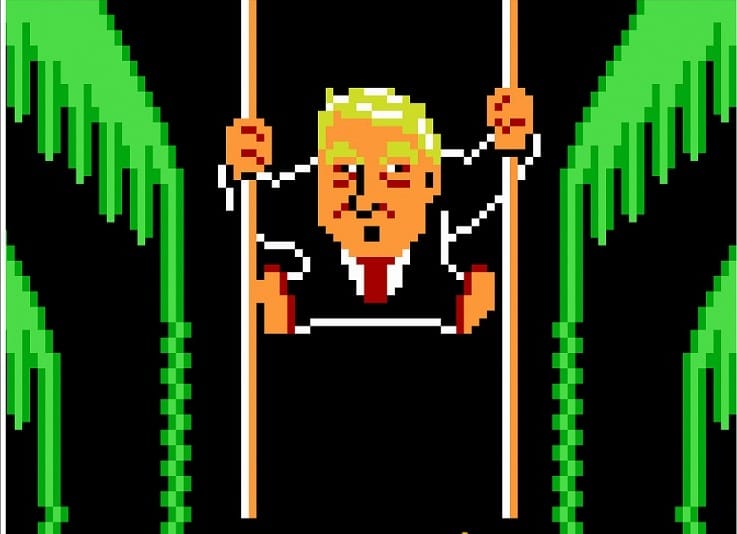
Punktendo’s interactivity is precisely what makes it most impactful when it is at its least comfortable. Urban Champion (1984), a game that was once only painful to play due to its poor controls, becomes much more unsettling when it pits two black men in a street fight. Inadvertently blowing yourself up in ISIS Bomberman while playing as an Islamic State terrorist is almost as uncomfortable as actually succeeding in your goal of bombing white NPCs. These types of games are not exactly intended to be mindless fun. In moments where the player finds themselves killing and beating innocent virtual citizens, Hong’s work moves beyond mining nostalgia for the sake of fun and instead delivers an emotional and philosophical gut punch. It challenges the purpose of play to be about more than harmless entertainment and instead encourages thoughtful introspection in a manner that is deceptively subtle and confrontational.
“I feel like a lot of these topics weren’t on people’s minds or weren’t part of the social conversation like they are now,” said Hong. “That’s also why I feel like Nintendo is such good source material for me. I can go back and change these games to make them more relevant to today’s issues.”
In this way, Hong’s Punktendo games bridge the gap between nostalgic fantasy and modern-day reality in a way that is rare for videogames at large. Many modern games reward players for committing unseemly acts—for example, who ever felt actual remorse for running over a pedestrian in Grand Theft Auto (1997). While some are able to incorporate topical or political leanings into their narrative—for example, the Metal Gear Solid series has long commented on the dangers of nuclear proliferation. Few, however, force players to confront the unsettling ironies inherent to enjoying playing games that glorify evil and inhumane behavior. At its most poignant, Hong’s work forces players to consider the consequences of their actions in the real world through the power of play.
art need not be comfortable to consume
These instances may be where Hong’s work most fully aligns with the punk ethic that art need not be comfortable to consume. This spirit and attitude is present throughout punk art, from its buzzsaw sound to its surrounding culture—afflicting the comfortable with discomforting counterculture messaging has been part of punk’s M.O. since its earliest incarnations. The Sex Pistols publicly criticized British royalty. The Clash spent the 80s infusing radio-friendly singles with subversive social commentary. Anarchist punk pioneers Crass resisted the comforts of capitalist consumerism through music, printed propaganda, and multimedia displays at live shows. Early punk documentary The Decline Of Western Civilization (1981) implied through its title alone that punk posed an existential threat to complacent manufactured culture. Pick up a copy of any contemporary punk zine, such as Maximum Rock And Roll or Razorcake, and you can expect to find economic and socio-political concerns covered alongside the music itself. Hong’s work similarly demands its audience actively consider what they’re consuming beyond its entertainment value, challenging status quo while bringing games into the wider sphere of punk media.
In true do-it-yourself spirit, Hong intends to continue the Punktendo project while teaching himself how to create his own games. His timing could hardly be better. Growing social and political unrest in Western media, combined with increasing interest in games among the broader culture, may create an audience finally ready to embrace games that confront current events. This is perhaps what most makes Hong an interesting industry figure to watch in the future as he accelerates his unifying passions for punk, interactive art, and social activism. Updating existing titles with countercultural cues is one thing. Original concepts offering fresh gameplay, however, could well be a gateway to something much bigger than mere nostalgic novelty.
“That’s my next bigger project I’m taking on down the line,” Hong said.


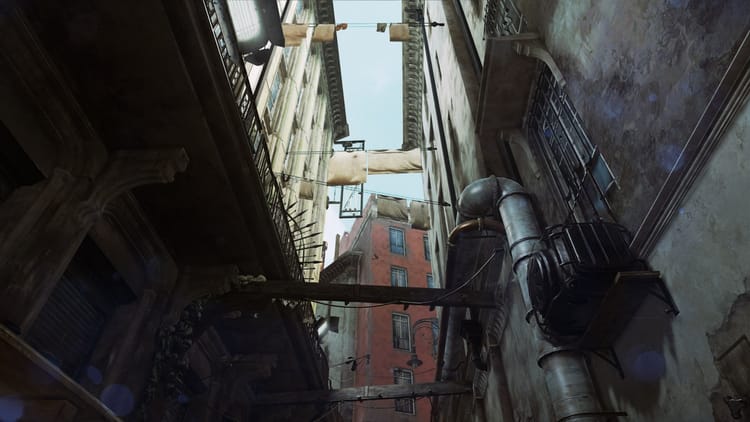
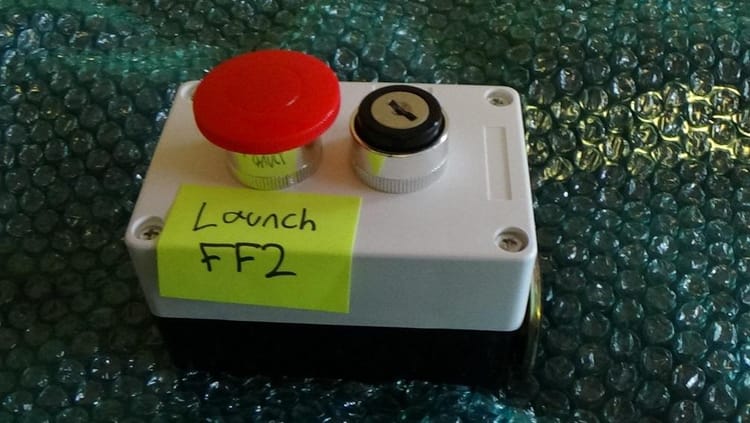
Comments ()